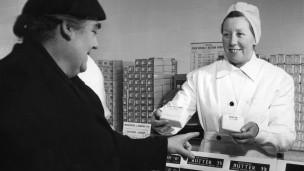Artificial scarcity 人为的物品缺乏
Vocabulary: consumer economy 词汇:消费者经济

Butter, bacon, sugar, tea and meat were rationed in Britain during World War ll
We expect companies selling products to make them as available as possible. But now some of them are bringing back rationing. As you might expect, it's all part of a plan to make us spend more, not less.
Once upon a time, goods were scarce, and hard to get for all but the extremely wealthy. But industrial mass production has changed all of that. Factories all over the world are pumping out bright and beautiful objects.
When everyone has to wait and save up for new things, owning them feels exciting and special. But when lovely things are available every day, they stop being a treat.
收听与下载
Another feature of consumer society is that we aim for social distinction through what we own. But if everyone has lots of stuff, how can we impress anyone with our purchases? All of this takes the fun out of shopping and means there's a limit to how much consumerism can grow.
This is deeply worrying to companies, and some of them have started to fight it, by creating artificial scarcity. For example, in Singapore, a small cafe called Liberty Coffee only opens on random days. It sometimes stays closed for over a week at a time. Swedish rapper Adam Tensta has limited access to his latest track. Only one person at a time can access it, and fans must take their place in a digital queue.
This trend means we can again own something rare. But the risk for these companies is that in a world of so much stuff, if they make their products too hard to get, we'll just buy from someone else instead.
Glossary 词汇表 (点击单词收听发音)
- products 产品
- available 有货,可买到的
- rationing定量供应
- scarce稀少的
- hard to get难以获得的
- industrial mass production工业化的大批量生产
- pumping out批量推出
- save up for存钱以便(购买某物)
- treat款待
- consumer society消费者社会
- social distinction优等社会地位
- stuff(泛指任何)物品,东西
- impress给人深刻印象
- purchases购买
- takes the fun out of失去了乐趣(意义)
- artificial scarcity人为的物品缺乏
- random 任意的
- limited access to限制收听权
- queue队伍
- trend潮流
- rare稀罕的

